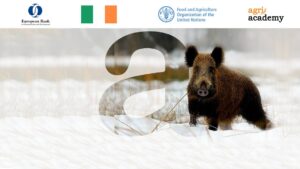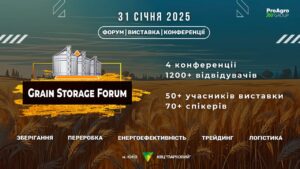
The European Bank for Reconstruction and Development (EBRD) has approved the New Horizons technical cooperation program aimed at stimulating innovative investments in Ukraine’s agri-food system, the bank’s press service reported.
The project is expected to become a key tool for restoring the national economy and accelerating the European integration of agribusiness, the EBRD noted.
According to the project description, the program is focused on supporting businesses that implement advanced technologies in food production and agriculture.
The key areas of the New Horizons program are stimulating investment based on a combination of industry analytics and mapping opportunities for informed investment decisions; supporting high-potential segments by supporting areas such as alternative protein production and sustainable intensive agricultural production.
In addition, the project aims to establish international cooperation, in particular between Ukrainian businesses and leading international research and development (R&D) institutions, to strengthen innovation potential. It is expected that selected Ukrainian enterprises will be provided with audit and innovation screening services to identify opportunities for modernizing their business processes.
The program also includes a review of the Ukrainian agrotech sector’s compliance with EU requirements for food safety, sustainable development, and digital trade standards.
The research results and innovation opportunities will be presented to Ukrainian companies during a special knowledge-sharing event that will bring together technology developers, startups, and large agribusinesses.
The EBRD is the largest institutional investor in Ukraine. Since the start of Russia’s full-scale invasion in 2022, the bank has directed more than EUR 8.5 billion to the country to support energy security, critical infrastructure, food security, trade, and the private sector.

AgriAcademy, a professional online course platform for agribusiness, announces the launch of a new free online course, ‘Biosecurity for Hunting Farms’, developed by experts from the Food and Agriculture Organisation of the United Nations (FAO) in response to one of the most serious threats to livestock and food security – African swine fever (ASF).
African swine fever remains one of the key biological risks for Ukraine. The virus is highly resistant in the environment and circulates continuously among wild boar populations, posing a constant threat to domestic livestock, hunting farms and related sectors.
That is why FAO experts have developed a specialised training course based on international experience in combating ASF, adapted to Ukrainian realities and wartime conditions.
What the course is about
The course focuses on the practical aspects of biosecurity for hunting farms in Ukraine, using ASF control as an example. It examines in detail the logical and effective sequence of actions applied in EU countries and other regions of the world:
Who is this course for
The training is designed for:
Practical outcome for participants
Upon completion of the course, participants will be able to:
Training format
The course includes video lectures, analytical materials, practical tools, real-life case studies and a final test. Training is conducted online in a convenient 24/7 mode.
Course author and lecturer
Oleksandr Revnivtsev, FAO international consultant on animal husbandry.
Training on the course is free and open to all registered users of the AgriAcademy platform.
Participants can study the materials online at their convenience, without time restrictions, and after successfully completing the final test, they will receive a certificate.
As a reminder, AgriAcademy – is a free online learning platform created on the initiative of the EBRD as part of its food security support programme in Ukraine. Its goal is to strengthen the competitiveness and sustainable development of agriculture, which has suffered significant losses due to the war.
The creation and management of the platform (including the development of courses, training tours, etc.) is carried out with the support and funding of the EBRD, as well as:
The AgriAcademy website currently offers over 30 free online courses for Ukrainian agribusiness professionals. Register and take courses at your convenience!

On November 19–20, 2025, Kyiv became the center of discussion on the future of food security and technological development in the agricultural sector. In parallel with the AgroExpo 2025 exhibition, the IV International Conference “Food from Ukraine” was held, organized by the Ministry of Economy, Environmental Protection and Agriculture of Ukraine in conjunction with the Ministry of Foreign Affairs of Ukraine and the Federation of Employers of Ukraine, with the support of the European Bank for Reconstruction and Development (EBRD).
The large-scale exhibition and business forum brought together those who are shaping the future of the agricultural sector: from representatives of the EU, G7, African countries, and the Global South to Ukrainian government officials, leaders of industry associations, manufacturers of machinery and equipment, and companies in the domestic food industry. It was a space where international diplomacy, innovative business, and science came together in direct dialogue. The organizers set themselves an ambitious goal: to show the world that the Ukrainian agricultural sector, despite the challenges of war, remains a driver of innovation. That is why special attention was focused on demonstrating modern technologies in production and processing, new solutions in agricultural engineering, and promoting Ukrainian food products to global markets.
Education has become a critical element linking technology, business, and practical development in the agricultural sector. That is why, for the first time, the exhibition featured the capabilities of AgriAcademy, a free online platform for agricultural education and certified online courses from leading Ukrainian and international experts. AgriAcademy.org is a free online learning platform for agricultural workers and students of agricultural education institutions, launched by the EBRD in December 2022 as part of its food security support program in Ukraine. Its goal is to strengthen the competitiveness and sustainable development of agriculture, which has suffered significant losses due to the war.
AgriAcademy as a navigational beacon amid technology, innovation, and the challenges of war
Visitors to the exhibition could see AgriAcademy information banners with QR codes that led directly to the course catalog. This format attracted considerable attention—farmers actively tested the QR codes, photographed the banners, and many participants learned for the first time about the possibility of certified free training in Ukrainian.
The AgriAcademy team handed out flyers with direct links to certified courses, and this simplicity of interaction became an advantage: specialists from various companies were able to register on the spot without delay.
According to many participants, today, when the industry is experiencing a shortage of personnel and technologies are changing faster than businesses can adapt, quality education is no longer an option — it is a necessity for recovery and growth.
Why interest in AgriAcademy is growing
After the war began, thousands of agricultural workers lost access to structured forms of training. AgriAcademy has become the answer to this problem — a platform that provides:
You can register and take courses here: https://agriacademy.org/courses-catalog/
The training programs cover areas such as crop production, berry growing, horticulture, agronomy, irrigation, animal husbandry, crop processing, organic production, and sustainable development.
By the end of 2026, AgriAcademy plans to launch 20 new courses that meet current market demands.
“Grow with us — with AgriAcademy!”
This message, present at the exhibition, became a key reminder that the future of agribusiness is impossible without continuous learning.
The labor shortage, which is getting worse every year, requires investment not only in technology but also in people. Companies that work with modern knowledge are more efficient, productive, and competitive.
AgriAcademy – training that works for results
Go to training:
https://agriacademy.org/courses-catalog/
AgriAcademy is a free online training platform created on the initiative of the EBRD as part of its food security support program in Ukraine. Its goal is to strengthen the competitiveness and sustainable development of agriculture, which has suffered significant losses due to the war.
The platform’s creation and management (including course development, training tours, etc.) is supported and funded by the EBRD, as well as:

July 11 | Kyiv
Every day, agribusiness is adapting to a new reality – reduced budgets, information overload, unstable logistics. And it is marketing, PR and content that are becoming tools for survival and growth.
That’s why we’re bringing together the best of the best for COMMBINE 2025:
a conference for marketers, communicators, brand owners, creators and everyone who promotes agriculture in the conditions of “permanent turbulence”.
The program includes:
25+ speakers – about TikTok, branding, PR, and fakaps
200+ participants – marketers, farmers, bloggers
1000+ ideas for advertising, field events, and content
12 hours of live networking and agri-brainstorming
COMMBINE 2025 is a field where ideas germinate.
Details and registration: commbine.fun
COMMBINE 2025: the main agromarketing event of the year – already on July 11 in Kyiv!
The agricultural sector continues to adapt to the new reality: reduced budgets, unstable logistics, dynamic markets, and information overload. In this situation, agromarketers, communicators, creatives, and PR specialists are coming up with new ways to turn challenges into opportunities every day.
That is why Aggeek Agency and Agro Marketing Agency are gathering leading market players for the agromarketing conference COMMODITY 2025, which will be held on July 11 in Kyiv.
COMMBINE 2025 is a field where ideas germinate, tools are tested, strategies are developed, and a community is formed that is able to lead agribusiness forward – even in turbulent times. Here people speak frankly, share their experience, joke about the budget and… make money.
The program:
25+ speakers – agro-evangelists of content, brands, reputation, and data
200+ participants – marketers, farmers, owners, media professionals, bloggers
1000+ ideas for promotional campaigns, branding, SMM and field events
12 hours of networking, coffee, craft thinking and joint agri-brainstorming
Key topics:
Agromarketing in conditions of permanent instability
How to talk to a farmer so that he can hear
TikTok, YouTube, Insta – which platforms work in the field
Agribranding: where to start and how to keep the style
Content plans and creativity in the season “without a budget”
PR without illusions: reputation in agriculture is not born in a day
Anti-cases and facts that are not written about on LinkedIn
COMMBINE 2025 is for those who:
promotes an agribusiness, product or brand
builds communication within an agricultural company
creates content, manages pages, organizes events
looking for inspiration, new approaches and useful contacts
Don’t miss it! If you want to harvest more than just a crop, you are welcome at KOMMBINE 2025.
Date: July 11, 2025
Location: Kyiv
Details and registration: https://commbine.fun/
Aggeek Agency, AGRIBUSINESS, Agro Marketing Agency, COMMBINE 2025

On January 31, Kyiv will host Grain Storage Forum, the largest agricultural forum in Ukraine dedicated to storage, processing, logistics and trading of agricultural products.
Organizers: Ukrainian Grain Association, PU “Millers of Ukraine”, Association of Elevators of Ukraine, Bioenergy Association of Ukraine, Agro Marketing Agency, Solar Energy Association of Ukraine, ProAgro Group.
Venue: 16a Parkova Road, Kyiv, CEC “Parkovy”.
The purpose of the forum isto analyze the current state of the industry, identify key problems, develop solutions for stable operation and increase the efficiency of agricultural production, processing, trading and logistics in wartime.
The forum will include:
– 4 conferences:
– Ukrainian Grain Conference
– Conference “Agro-processing: financing and investments”
– Conference “Agro-energy security and agro-energy efficiency”
– Conference “Grain storage and drying”
– Presentation seminars from market leaders;
– Speeches by leading industry experts with cases of effective agribusiness, government officials and experts;
– Exhibition of technological solutions and equipment from leading manufacturers;
– Lounge area, area for business communication;
– Coffee breaks, receptions, live music.
For more information, please visit the official website: https://grain-forum-elevator.com
For partnership and participation in the exhibition, please contact the organizers: +38 096 899 4272 | +38 067 243 3803 | proagro-inform@ukr.net

On June 12, Kyiv hosted the business forum “Grain. Pigs. Meat – 2024”, which brought together representatives of agribusiness, processing, supply, finance and investment, government agencies, experts and bloggers. We are grateful to the Armed Forces of Ukraine for this opportunity!
We are grateful to the guests, participants, partners and sponsors of the Forum from Kyiv, Chernihiv, Odesa, Mykolaiv, Lviv, Kharkiv and other cities and towns of Ukraine who attended the business forum “Grain. Pigs. Meat – 2024” and joined the discussion of crucial issues that help businesses move from confrontation to cooperation, provide new opportunities for scaling and development of entire sectors of the Ukrainian economy!
The Forum highlighted the issues that hinder the development of the Grain – Pigs – Meat value chain, held active discussions, proposed solutions and provided effective tools.

Forum participants learned about:
– The importance of developing industries that create added value in Ukraine’s economy in times of war, with raw material exports blocked, expensive logistics, and a cheap price for the raw material itself and its minimal added value
– The possibility of replacing grain exports with exports of meat and meat products, which are high value-added goods.
– The state and prospects of the pig and meat industry in Ukraine during and after the war.
– The next stages of implementation of the New Pig Breeding of Ukraine program, which envisages a fourfold increase in the number of pigs, from 6 to 12 billion euros of added value.
– Possibility of eradicating ASF in Ukraine through vaccine prevention, lifting the stamping out in industrial pig production and unblocking pork exports.
– Establishment of an international consortium to support ASF control measures in Ukraine and Europe.
– Adaptation of pig production in Ukraine to a possible decline in pig prices due to overproduction in the absence of pork exports.
– Investment opportunities for the meat industry, pig production and farmers.
– Newest and digital technologies for pig production and meat processing.
– The Family Pig Farms social project, which will help war veterans start a successful pig farming business.
– Opportunities to obtain additional funding, grants, and investment.
– Training of highly qualified personnel for meat industry enterprises.
– Implementation of a mechanism for cooperation between producers and processors to protect profitability throughout the chain.
We call for cooperation for the development of Ukraine and believe in Ukrainians who, even in the most difficult times, do their best to rebuild our country. Only together we can make the Ukrainian agro-industrial complex stronger, more sustainable and competitive in the global market!